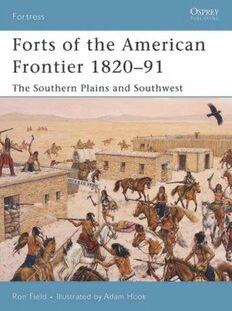
Forts of the American Frontier 1820-91 - The Southern Plains and Southwest PDF
68 Pages·2006·28.336 MB·English
Most books are stored in the elastic cloud where traffic is expensive. For this reason, we have a limit on daily download.
Preview Forts of the American Frontier 1820-91 - The Southern Plains and Southwest
Description:
During the early decades of the 19th century, the Southern Plains of the North American continent were only occasionally visited by explorers, trappers, traders, and missionaries. The first trading posts and forts were built then, such as Adobe Walls in the panhandle of North Texas, and Tubac Presidio in New Mexico. During the 1840s, when the 'Great American Desert' became the scene of an inexorable westward expansion, European pioneers and settlers flooded overland from the eastern seaboard. As they headed west, these settlers invaded and absorbed the traditional lands of the Native American. Via a series of Acts passed by Congress, many members of the Five Civilized Tribes (the Creek, Cherokee, Choctaw, Chickasaw and Seminole) were moved to reservations. It was hoped that a Permanent Indian Frontier guarded by a line of military forts would separate the Indian from the 'white man' forever. Numerous posts were built to police the southern end of this frontier between 1820 and 1840.Following the establishment of the Republic of Texas in 1836, and the Mexican War of 1846-48, the lands and wealth then acquired lured many more migrants to the Southwest. The resulting trails first breached and then destroyed the Permanent Indian Frontier. The US Government constructed a line of forts on the Texan frontier in 1848-49 to protect traders and settlers. This chain, which included forts Graham, Worth, Gates, Crogham, Inge and Duncan, extended for more than 800 miles. In 1850-52 it became necessary to erect another line of posts 200 miles further west, in order to keep pace with the rapidly advancing frontier and protect against the marauding Kiowas and Comanches. To combat constant Apache and Navajo raids, a network of posts was built in New Mexico throughout the remainder of 1850s.During the Civil War, the Texan forts seized and occupied by Confederate forces came under regular attack from marauding Indians. Also, in 1864, Kiowa and Comanche attacks on Santa Fe wagontrains on the borders of New Mexico Territory prompted a punitive expedition led by Colonel Christopher "Kit" Carson which led to the First Battle of Adobe Walls.This book is a detailed exploration of the design and development and operational histories of all of these forts and defensive systems.
See more
The list of books you might like
Most books are stored in the elastic cloud where traffic is expensive. For this reason, we have a limit on daily download.
